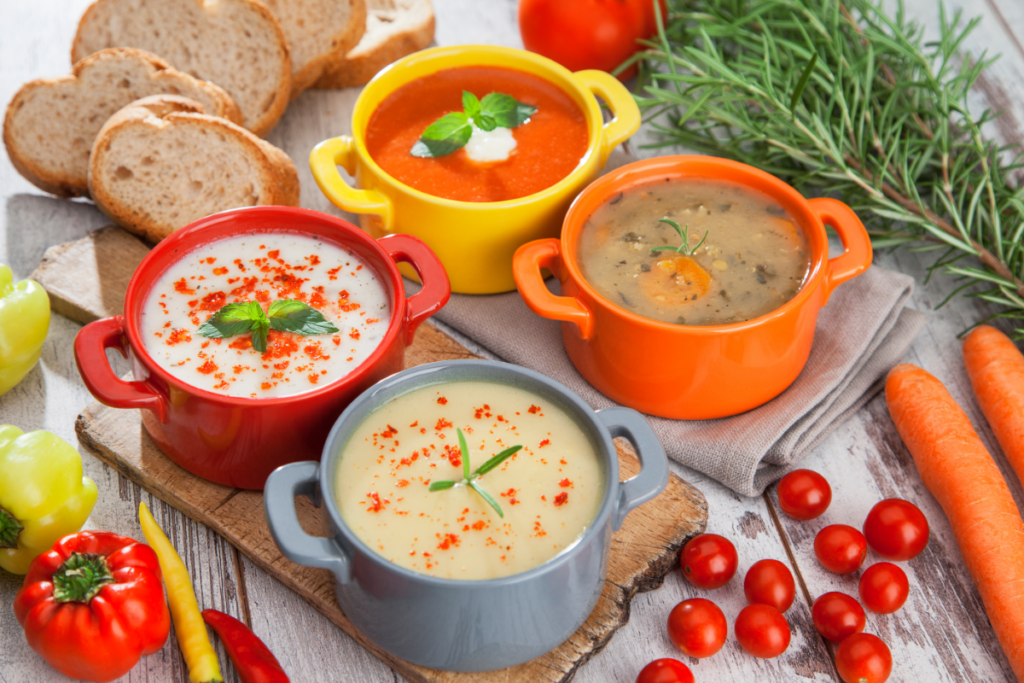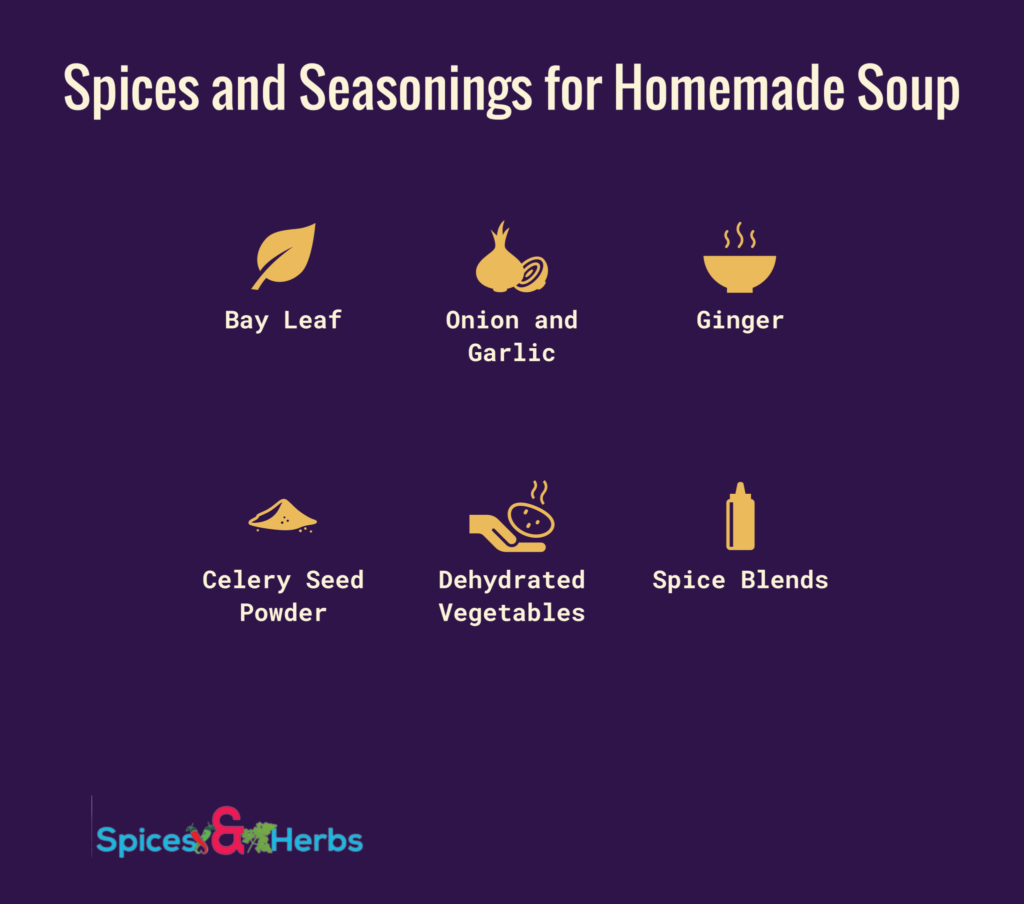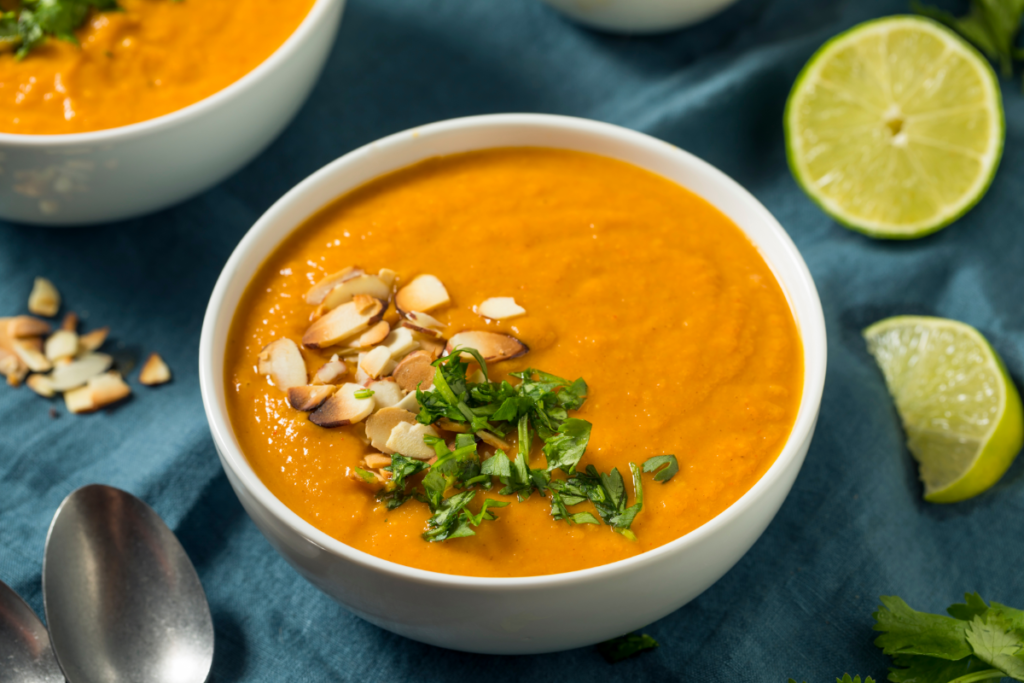The soup is tasty and warming, but sometimes it doesn’t have enough flavor. Adding the right spices and seasonings for homemade soup can take it to the next level and make it a cooking treat. You can change and improve the flavors of your favorite soups in a million different ways, like by adding salt to make them taste better or trying out different spice mixes. This piece will discuss how to season homemade soup, what spices and seasonings are used for, must-have spices and seasonings, spice mixes for soup, and some more seasoning tips.
The Basics of Homemade Soup Seasoning

Making great homemade soup requires spice. With the correct spices and seasonings, you can flavor your soup quickly. Salt adds flavor, but you should tailor the amount to your liking. Besides salt, several herbs and spices may give depth and complexity to soup.
┈Start with a Solid Base┈
A great way to begin your soup seasoning is by using a vegetable soup mix as a base. These mixes typically contain a blend of spices like celery salt, parsley flakes, and garlic powder, providing a savory foundation for your soup. Additionally, adding lemon zest, oregano, or basil can enhance the flavors of vegetable, black bean, and sweet potato soups.
┈Experiment with Different Combinations┈
The beauty of homemade soup seasoning lies in the freedom to experiment with different combinations of herbs and spices. Whether you prefer a classic flavor profile or want to explore unique blends, the possibilities are endless. By trying out different spices, you’ll discover exciting ways to customize and enhance the taste of your favorite soups.
- Adjust the amount of salt to suit your taste preferences
- Start with a vegetable soup mix as a base
- Enhance flavors with lemon zest, oregano, or basil
- Experiment with different combinations of herbs and spices
With the basics of homemade soup seasoning in your arsenal, you can create soups bursting with flavor and guaranteed to satisfy your taste buds.
Must-Have Spices and Seasonings for Homemade Soup

When it comes to seasoning soup, there are a few must-have spices and seasonings that can bring out the best flavors in your homemade creations. These essential ingredients can elevate your soup from ordinary to extraordinary, adding depth and complexity to each spoonful. Here are some key spices and seasonings that should be in every soup lover’s pantry:
🧂Bay Leaf:
This subtle herb adds a delicate flavor to meaty soups without overpowering the dish. It infuses the broth with aromatic notes, creating a rich and satisfying taste.
🧂Onion and Garlic:
These dynamic ingredients are a staple in many soup recipes. They add depth and enhance the natural flavors of vegetables and meats, creating a savory and mouthwatering experience.
🧂Ginger:
Known for its unique heat and zest, ginger pairs well with soups with a hint of sweetness, such as sweet potato soup. It adds a lovely kick and complements the other ingredients perfectly.
🧂Celery Seed Powder:
This seasoning is often overlooked but can make a world of difference in your soups. It adds a subtle, earthy flavor that enhances the overall taste profile.
🧂Dehydrated Vegetables:
Shallots, bell peppers, and other dehydrated vegetables can add depth and complexity to your soup. They bring a burst of flavor and are a convenient way to incorporate additional vegetables into your dish.
🧂Spice Blends:
Experimenting with spice blends like Moroccan Vegetable Rub or Smoky Citrus Salt can take your soups to the next level. These blends are carefully crafted to complement a variety of soup flavors and add a unique twist.
By having these must-have spices and seasonings in your pantry, you can create flavorful and satisfying soups that will impress your family and friends. Don’t be afraid to experiment with different combinations and adjust the quantities to suit your taste preferences. The beauty of homemade soup lies in its versatility and ability to be tailored to your liking. With these essential ingredients, you have the key to unlocking a world of delicious soup possibilities.
Customizing Soup Flavors with Spice Blends
Spice blends are a game-changer when adding flavors to your homemade soups. They offer a convenient way to elevate the taste profiles and create unique culinary experiences. One excellent example is the Moroccan Vegetable Rub, which combines the richness of paprika, the depth of chili powder, and the warmth of cinnamon. Adding this blend to a classic tomato soup can transform it into an irresistible dish with an exciting new dimension.
Another fantastic option is incorporating Mediterranean oregano or basil into your black bean soup. These herbs bring out the natural flavors of the beans, creating a harmonious and irresistible combination. Additionally, a versatile spice blend like Vegetable Soup Mix can work wonders as a base for your vegetable soups. With its combination of celery salt, parsley flakes, garlic powder, and more, it adds complexity and depth to your creations.
When using spice blends, the possibilities are endless. You can experiment with different combinations to suit your taste preferences and explore a world of exciting flavors. Get creative and let your imagination run wild as you customize your soup flavors with these extraordinary spice blends.
Pairing Spices with Soup Ingredients

When it comes to making delicious homemade soups, the right combination of spices can take your flavors to the next level. Each ingredient in your soup can be enhanced and complemented by carefully chosen spices. Here are some key pairings to consider:
🥣Chicken Noodle Soup
- Celery seed
- Minced onion
- Minced garlic
- Salt
- Black pepper
- Poultry seasoning
These spices create a flavorful broth for your chicken noodle soup. The celery seed adds a subtle earthy flavor, while the minced onion and garlic provide aromatic depth. Salt and black pepper are staples for seasoning, and poultry seasoning brings out the best in the chicken.
🥣Potato or Sweet Potato Soup
- Cayenne pepper
- Smoked sweet paprika
- Black pepper
- Salt
Potato and sweet potato soups can benefit from a touch of spiciness. Cayenne pepper adds a gentle heat, while smoked sweet paprika provides a smoky richness. Black pepper and salt enhance the flavors further, creating a well-balanced and comforting soup.
🥣Vegetable Soup
- Turmeric
- Basil
- Lemon zest
- Black pepper
- Salt
For vegetable soups, a combination of turmeric, basil, and lemon zest can elevate the flavors of the root vegetables. Turmeric adds a warm, earthy taste, while basil brings a fresh and herbaceous note. Lemon zest brightens the flavors, and black pepper and salt round out the seasoning for a delicious vegetable soup.
By understanding which spices pair well with different soup ingredients, you can create harmonious flavors that bring out the best in each dish. So, next time you make homemade soup, don’t forget to spice it up and enjoy a delightful burst of flavors.
Cooking Techniques and Timing for Soup Seasoning
When it comes to seasoning your homemade soup, the cooking techniques and timing play a crucial role in achieving the perfect flavors. Here are some tips to help you enhance the taste of your soups:
━Cooking Techniques:━
- Add spices and seasonings gradually: Adding spices allows the flavors to meld together over time, resulting in a more balanced and flavorful soup.
- Start with a solid base: Using a vegetable soup mix or other pre-made blends as a base can provide a foundation for flavors to build upon.
- Infuse flavors with bay leaf: Adding bay leaf at the beginning of the cooking process allows its flavors to infuse into the soup gradually.
- Add fresh herbs towards the end: Fresh herbs like parsley or basil are best added towards the end of cooking to preserve their freshness and vibrant flavors.
- Use finishing salts: Sprinkle finishing salts on top of the soup just before serving to add texture and visual appeal.
━Timing Tips:━
- Simmer for optimal flavor: Allowing your soup to simmer for a longer period can help flavors develop and intensify.
- Taste and adjust: Regularly taste your soup as it cooks and adjust the seasoning accordingly to ensure a well-balanced taste.
- Remember the size of ingredients: Larger ingredients, such as whole spices or vegetables, may require more cooking time to release their flavors.
- Consider the type of soup: Different types of soups may require different cooking times and techniques. For example, a hearty stew may benefit from slow cooking, while a light broth may need less cooking time.
By following these cooking techniques and timing tips, you can create soups bursting with flavors and sure to impress your taste buds. Remember to experiment and adjust to your personal preferences to create a homemade soup that is truly delightful.
Additional Soup Seasoning Tips
When it comes to seasoning your homemade soups, there are some additional tips and tricks that can take your flavors to the next level. Here are a few ideas to enhance your soup seasoning game:
- Try dried herb and spice mixes: Using pre-made dried herb and spice mixes like chili seasoning or onion soup mix can save you time and ensure consistent flavors in your soups. These mixes are convenient and can be prepared in advance, allowing you to control the ingredients and tailor the flavors to your liking.
- Experiment with liquid-based ingredients: Don’t be afraid to add some depth and complexity to your soups by experimenting with liquid-based ingredients. Adding a splash of beer, wine, vinegars, sauces, or oils can bring new dimensions of flavor to your homemade creations. Just be mindful of the quantities and flavors you’re adding, as a little can go a long way.
- Don’t underestimate the power of finishing touches: Consider sprinkling some finishing salts on top of your soup just before serving. Finishing salts not only add a touch of texture but also enhance the visual appeal of your dish. They can provide that perfect finishing touch to make your soup look and taste even more delicious.
By incorporating these additional soup seasoning tips into your cooking routine, you can elevate the flavors of your homemade soups and create a truly memorable dining experience.
Frequently Asked Questions
Are there any health benefits associated with certain spices used in soup?
Yes, some spices used in soup can be good for your health. For example, garlic and turmeric are believed to have anti-inflammatory properties. Ginger can help with digestion, and chili peppers might boost your metabolism. But remember, it’s all about balance, so don’t go overboard with them.
How can I make a bland soup more flavorful with spices and seasonings?
To make a bland soup tastier:
- Start by adding small amounts of salt and pepper.
- Experiment with spices like paprika, cumin, or thyme to give it more flavor.
- Taste as you go and adjust until it’s just right for your palate.
How can I adjust the amount of salt in my soup without affecting the overall flavor?
If your soup is too salty, try diluting it by adding more water or unsalted broth. You can also balance the saltiness with ingredients like potatoes, rice, or vegetables. Just be patient and taste as you make adjustments.
What is the difference between herbs and spices in soup recipes?
Herbs are typically the green, leafy parts of plants, like basil or parsley. They add freshness and aroma to your soup. Spices, on the other hand, come from other parts of plants, like seeds, roots, or bark. They bring stronger flavors and warmth, like cumin or cinnamon.
Can I substitute fresh herbs for dried spices in soup recipes?
Yes, you can substitute fresh herbs for dried spices in your soup. Typically, you’ll need more fresh herbs than dried ones for the same flavor. For example, if a recipe calls for a teaspoon of dried oregano, you might use a tablespoon of fresh oregano. Just remember that fresh herbs are more delicate, so add them towards the end of your cooking.
Final Words
In crafting homemade soups, I’ve discovered that spices and seasonings are like the magic keys to a world of flavor. They’ve turned my bland pots of soup into aromatic, mouthwatering creations that warm my heart and soul. The ability to balance herbs and spices, adapt to the situation when I accidentally oversalted, and choose the right ingredients has been a culinary adventure that’s enriched my life.
It’s like being given a palette of colors to paint a masterpiece, and I’m grateful for the knowledge I’ve gained about how to use them to create the perfect soup every time.
So, as you embark on your own soup-making odyssey, remember that with the right spices and seasonings, your soup can be a masterpiece too, a warm hug in a bowl.

